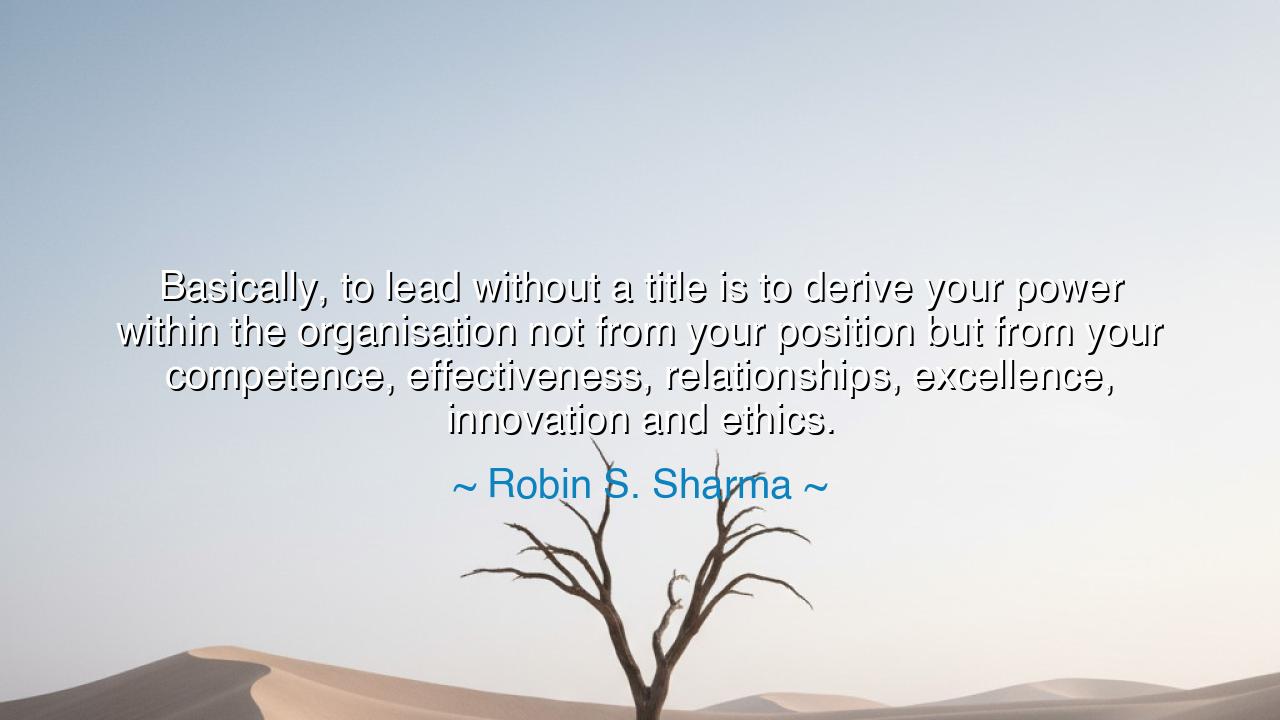
Basically, to lead without a title is to derive your power
Basically, to lead without a title is to derive your power within the organisation not from your position but from your competence, effectiveness, relationships, excellence, innovation and ethics.






Hearken, O children of discernment, to the wisdom of Robin S. Sharma, who speaks of the true essence of leadership. He declares that to lead without a title is to wield influence not through position, rank, or outward authority, but through the inner strength of competence, effectiveness, relationships, excellence, innovation, and ethics. Herein lies a teaching for the ages: the measure of a leader is not found in titles, but in the power of the soul expressed through action and virtue.
The origin of this reflection is rooted in Sharma’s life as a leadership mentor and author, observing the workings of organizations and the nature of human influence. He discerned that the greatest leaders often emerge from among the ranks, not from exalted office, guiding others through the force of their character, insight, and moral example. True power arises when one cultivates mastery, integrity, and vision, rather than relying solely on institutional authority.
The meaning of this aphorism is profound: influence flows from the quality of one’s work, the strength of one’s relationships, and the courage to innovate and uphold ethics, rather than from the mere possession of a title. A leader who acts with excellence, insight, and integrity inspires trust and loyalty, and the power they exercise is enduring, even in the absence of formal rank. Sharma reminds us that leadership is a living quality, cultivated by virtue and skill.
History provides vivid illustration of this principle. Consider Mahatma Gandhi, who led millions not through official position, but through the force of moral authority, ethical action, and persistent innovation in strategy. Gandhi’s power rested in his competence to inspire, his ethical steadfastness, and his ability to forge deep relationships with the people. Here is the enduring truth: leadership emerges from character and action, not from titles or hierarchy.
Moreover, this teaching extends to all who seek to guide and influence others. The apprentice who mentors peers, the thinker whose ideas shape discourse, the worker whose dedication uplifts a community—all demonstrate that one may lead without a title. Sharma’s counsel reminds us that influence rooted in skill, integrity, and vision surpasses the fleeting authority conferred by formal rank, creating enduring impact and respect.
O generations yet unborn, take this counsel into your hearts: cultivate competence, excellence, innovation, ethics, and relationships, and let these be your instruments of leadership, even without title or office. For it is through virtue, mastery, and moral courage that true power is exercised, inspiring others and shaping the destiny of organizations, communities, and the world across the ages.






KBkhai Bui
This statement resonates with modern leadership philosophies that emphasize authenticity and collaboration. It reminds me of how some of the most effective team members quietly shape culture through their behavior and work ethic. But I’m curious—how can organizations identify and nurture these ‘titleless leaders’? Perhaps HR and management should focus less on hierarchy and more on creating environments where character-driven leadership naturally flourishes.
YYumii09
I find this idea both inspiring and challenging. It democratizes leadership, but it also demands a lot of self-discipline and emotional maturity. To lead without authority means relying on persuasion, trust, and consistency. I wonder—how do people maintain that kind of influence when faced with resistance or office politics? It seems like leading this way requires not only skill, but also deep personal conviction.
GNThi Giang Nguyen
This makes me reflect on the nature of power itself. If real influence comes from competence and ethics, then leadership becomes an act of service rather than control. But how do we cultivate this mindset in competitive workplaces that often prize visibility over substance? Maybe it requires redefining success—not as climbing the ladder, but as uplifting others and leaving a lasting ethical footprint.
HYNguyen Thi Hoang Yen
I think this quote highlights something we often overlook: leadership is more about character than position. But I also wonder—how do you sustain motivation to lead when recognition is limited? People who lead informally often face burnout or invisibility. Should organizations develop systems to support these kinds of leaders? It feels like Sharma is calling for a cultural shift in how we define and reward impact.
PVPham Phong Vinh
This perspective is empowering—it suggests that leadership is accessible to everyone, not just those in management roles. Still, I find myself questioning whether this ideal holds up in highly bureaucratic environments. Can someone without an official title really inspire transformation when decisions are controlled from the top? Perhaps true leadership without a title requires courage, emotional intelligence, and the patience to influence from the margins.